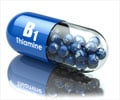Introducing thiamine fortified fish sauce to mothers’ diets is a simple and cost-effective way to raise breast milk thiamine levels to fight infantile beriberi.

- Thiamine deficiency causes infantile beriberi, leading to higher rates of infant mortality.
- Infantile beriberi is more common in Southeast Asia
- Thiamine-fortified fish sauce can improve thiamine levels in maternal blood and breast milk
Thiamine Deficiency
Thiamine (vitamin B1) is a water-soluble micronutrient which plays a crucial role in the energy metabolism for growth, development and function of cells. Thiamine is found in whole grains, beans, bread, meat, and fish. Thiamine deficiency occurs when the diet mainly consists of polished rice and wheat flour, which are poor sources of thiamine.Infantile Beriberi
Thiamine deficiency remains a public health concern in countries that rely on polished rice which is a poor source of thiamine. Lack of thiamine in the mother’s diet causes beriberi in infants (infantile beriberi), leading to heart failure and death. Infantile beriberi is characterized by vomiting, convulsions and signs of heart failure. The disorder could be fatal if not treated within 24 hours.
Infantile beriberi is widespread across Southeast Asia and kills 700 children a year in Cambodia. Maternal dietary factors and lack of consumption of thiamine-rich foods are the causes of infantile beriberi in Cambodia. Infantile beriberi can be eradicated by food fortification - an inexpensive process which improves the foods’ nutritive value by adding the essential micronutrient.
Recommended Dietary Allowance (RDA) for Thiamine
| Age | Thiamine Requirement |
| Birth to 6 months | 0.2mg |
| 7 to 12 months | 0.2mg |
| 1 to 3 years | 0.5mg |
| 14 to 18 years | 1.2 mg |
| 19 to 50 years (Male) | 1.2mg |
| 19 to 50 years (Female) | 1.1mg |
| Pregnancy | 1.4mg |
| Lactation | 1.4mg |
Researcher Timothy J. Green, Ph.D., of the South Australian Health and Medical Research Institute, Adelaide, Australia, along with coauthors conducted the clinical trial. The researchers studied whether the fish sauce fortified with higher and lower concentrations of thiamine would improve the levels of erythrocyte thiamine diphosphate concentrations (eTDP), a marker of thiamine status.
The results of the clinical trial showed that the levels of eTDP were higher among lactating women who consumed thiamine-fortified fish sauce and their breastfed infants than those in the control group.
The limitations of the study included lack of normal levels of eTDP for women due to variability in the cutoff value. Fish sauce has already been fortified with iron in Cambodia and Vietnam. So, the authors considered fortifying fish sauce with thiamine throughout Southeast Asia.
The authors concluded that “more research designed to enable a large, pragmatic randomized clinical trial is required to address some of the limitations of this efficacy trial, in particular, optimizing the level of fortification and acquiring clinical diagnoses of infantile beriberi."
The findings are published in the JAMA Pediatrics.
References:
- http://media.jamanetwork.com
- http://apps.who.int/iris/bitstream/10665/66139/1/WHO_NHD_99.13.pdf
- https://ods.od.nih.gov/factsheets/Thiamin-HealthProfessional/













